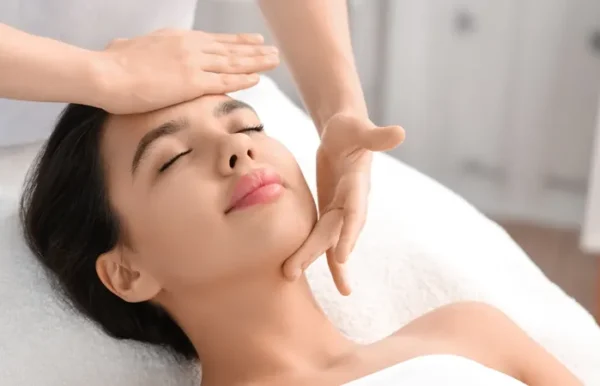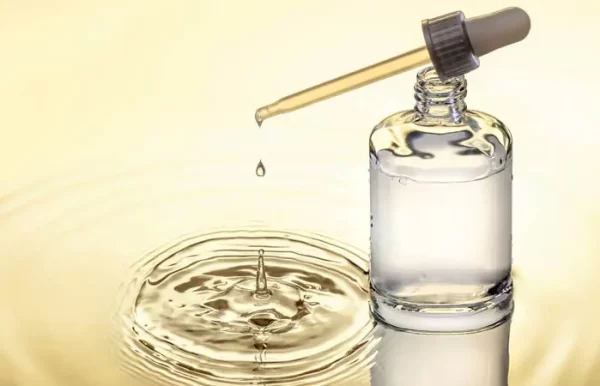Vitamin E and Skin Health
Vitamin E is a powerful antioxidant with anti-inflammatory properties, which makes it ideal as a skin treatment. It can repair damage to the sensitive skin, lessen swelling, moisturize, and it has anti-aging properties. It can also provide protection from the effects of the sun’s rays. There are 8 different forms of vitamin E for skin, which is also referred to as tocopherol. (1)
Human beings derive their Vitamin E from food, and we generally take in enough each day to be adequate. It can come from foods like spinach, nuts, whole grains, sunflower oil, olive oil, salmon, and green vegetables. (2) It’s important to prevent Vitamin E deficiency, as it can lead to health problems like muscle and nerve damage.
Evans and Bishop discovered Vitamin E in 1922 and others named it tocopherol in 1936. It’s been a staple ingredient in skin care products for at least 50 years, particularly in anti-aging products, because many people swear by its positive effects. (1)

Why It’s Best and How to Use Vitamin E
Vitamin E is one of the most potent substances available for the skin. If you’re looking for anti-aging benefits, this should be at the top of your list. You can purchase Vitamin E as a part of organic wrinkle cream or lotion which contains other ingredients such as retinol skincare and peptides for skin, or you can buy pure Vitamin E oil and apply it to the areas you want to treat. You can also get it in the form of anti ageing pills.
If you’re using Vitamin E cream, apply it to your face and neck and rub it in with circular motions until it’s absorbed. If the product is a serum or oil, take a couple of drops onto your fingers and apply it to the places on your skin where you want to remove wrinkles, and massage until absorbed. For capsules, follow the instructions provided on the product.
What Vitamin E Do for Skin?
As a powerful antioxidant, Vitamin E treats your skin by killing damages caused by dangerous free radicals and lowering the amount of oxidative stress. It helps reduce inflammation and even skin tone. This has a strong impact on aging skin, assisting in smoothing out fine lines and wrinkles and lessening the appearance of age marks and pigmentation. In addition, free radical eradication can protect the skin from the effects of the sun’s powerful rays. (3)
It has anti-inflammatory properties which can lessen swelling and help with easing certain skin conditions. This can also assist with diminishing puffiness and bags under the eyes. When you use Vitamins (E) for skin healing, as always, it’s very soothing and calming.
The vitamin is also quite hydrating, which provides the skin with the needed liquid. This moisturizes, and it can also give the skin volume which helps to smooth out forehead wrinkles and frown lines on the face. Hence, it is often used in several face moisturizers for men and women.
How Vitamin E Helps Skin
There’s a reason why it has been used in skin care for more than 50 years. This amazingly useful substance provides rich benefits to the epidermis. Here are the facts about what Vitamin E does and doesn’t do.
Scars: Vitamin E for skin care has long been touted as a substance which can eliminate scars from the body. In fact, there’s very little evidence to support this claim. This is also true of healing wounds and getting rid of stretch marks. In fact, in some cases, Vitamin E can cause a skin reaction if you apply it to scars and other marks. (4)
Wrinkles and Lines: It is an excellent anti-aging ingredient. Antioxidants repair skin damage, which can help get rid of the signs of age. It’s also very hydrating, and the moisture gives the skin additional volume. As a result, this helps to smooth out under eye wrinkles, around the mouth and expression lines.
Sun Protection: It has the ability to protect your skin from the possible dangerous effects of the sun’s rays. In addition, the sun can deplete the amount of Vitamin E in your body. It’s a good idea to use a cream with Vitamin E such as Rodan + Fields, Clinique, Perricone MD, Mario Badescu, Jeunesse Instantly Ageless, and Image Skin Care or take a supplement with Vitamin E, especially in the summer.
Moisturizing and Dry Skin: This vitamin contains a lot of moisture, which makes the skin hydrated and eliminates dry skin. As such, Vitamin E for moisturizers for dry skin will really enrich your skin. Check the products you purchase for this substance.
Blackheads: Vitamin E for skin care can’t actually unclog your pores. However, the antioxidant properties it includes can prevent the oils from going through the oxidation process, which is what leads to the black color. (4)
Skin Conditions: As a strong anti-inflammatory, many people use Vitamin E for skin healing. In addition, it’s also very effective at treating sunburn and other swelling. This includes erythema and edema.
(5)
Age Spots: It has the ability to diminish age spots and areas of pigmentation on the skin, by replenishing the skin cells on the surface. This can also have the effect of lightening the surface of the skin and giving it a more glowing, youthful appearance.
SEE ALSO – Alpha and Beta Hydroxy Acids (Glycolic, Lactic and Salicylic Acids) and Hyaluronic Acid
People Also Ask
Q: Are Vitamin E Capsules Good for Skin?
A: Yes, these Vitamin E capsules for skin can make your skin glow and provide anti-aging benefits. They can help to smooth and hydrate the skin and assist in treating skin conditions. This form of Vitamin E application may help neutralize free radicals directly. The maximum dosage you should take is 15mg per day. You can purchase it from a number of on and offline retailers.
Q: Can Vitamin E Lighten Skin?
A: Yes, in fact, Vitamin E benefits areas of pigmentation on the skin. It does this by getting rid of dead skin cells and regenerating new cells on the skin’s surface.
Q: Will Vitamin E Help Acne Scars?
A: Many people believe that Vitamin E for skin contributes to fading scars on the body, including acne scars. It’s been used this way for a long time. In fact, the research into the area doesn’t show these positive results. However, it may help somewhat by getting rid of dead skin cells and replenishing them, and by moisturizing the area. Since vitamin E enhances the skin’s regeneration process, it is often thought of as a great antidote for stubborn acne scars. Many companies like Proactiv, Murad Skin Care, Mary Kay Skin Care, and Obagi use Vitamin E for face moisturizer. (1)
Q: Can Vitamin E Oil Expire?
A: Yes, it’s possible that the product could oxidize over time, and this is especially true if you leave it out too long in the heat, light, or air. Make sure that you keep your Vitamin E oil stored in a cool, dry place because that way it will keep well over time.
Q: Where Does Vitamin E Come From?
A: Much of Vitamin E comes from oils like a germ, safflower, sunflower, corn, and soybean oils. There are also a number of seeds and nuts that contain good amounts of Vitamin E. It is also found in green vegetables such as spinach and broccoli. In addition, some manufacturers add Vitamin E to foods for healthy skin such as breakfast cereals and margarine. (7)
Q: Will Vitamin E Help Dry Skin?
A: It is a very hydrating substance which provides the skin with a tremendous amount of liquid. This can certainly alleviate dry skin by deeply moisturizing. Many brands use vitamin E for skin cream such as SIO Beauty, La Mer’s Crème de la Mer, Crepe Erase, and The Ordinary Skin Care. However, it’s better not to overdo it with Vitamin E cream. For some people, it can lead to skin irritation.
Q: Will Vitamin E Clog My Pores?
A: There’s a possibility that Vitamin E for your face could clog the pores, most particularly in areas where you already have acne. For this reason, it’s better not to apply this product on your face at night. This is more likely to lead to clogging. (8) Moreover, some experts believe vitamin E should be avoided in people with very oily skins, since it contributes to skin clogging.
Q: Can vitamin E be applied directly on face?
A: Yes, it can be applied topically to your face to reduce inflammation and make your skin look younger. Vitamin E capsules are best to make your own homemade mask treatments. It is recommended for dry skins especially because of the winter. The vitamin E inside the capsule is intact and ready to be applied. Many people also swear by the effects of topical vitamin E when it’s applied to the face overnight.
Q: How long does it take for vitamin E to work on skin?
A: A couple of small studies have shown topical application of vitamin E can improve skin water-binding capacity after two to four weeks of use. (9) Long-term studies with topical vitamin E are needed to establish if these moisturizing effects can be sustained.
Conclusion
Vitamin E for skin care is a powerful substance which offers some incredible, enriching benefits. It’s a potent antioxidant which can repair damage to the skin. In addition, it can fix some of the signs of age. This vitamin has anti-inflammatory benefits which have the ability to lessen facial redness and swelling and help to treat some skin conditions.
Vitamin E for your face can get rid of dead skin cells and replace them with fresh new ones. It naturally improves the skin’s regeneration, resulting in alleviating discoloration and reduced pigmentation. This can help in eliminating dark under-eye circles, age spots or areas of pigmentation. This substance is also very hydrating and an excellent moisturizer for the dehydrated skin. We recommend Vitamin E for skin oil.
Vitamin E oil is an ingredient in many skin and anti-aging creams like Nerium Age-Defying Night Cream, Meaningful Beauty, Advanced Dermatology, and No. 7 Serum, as well as supplements. It’s one of the most effective skin-care substances available and highly sought out for its many enriching benefits. If you suffer from dry skin, signs of age, crow’s feet or skin conditions, we highly recommend that you incorporate Vitamin E into your skin care routine. We promise you won’t regret it.






 This article changed my life!
This article changed my life!
 This article was informative.
This article was informative.
 I have a medical question.
I have a medical question.

 This article contains incorrect information.
This article contains incorrect information.
 This article doesn’t have the information I’m looking for.
This article doesn’t have the information I’m looking for.